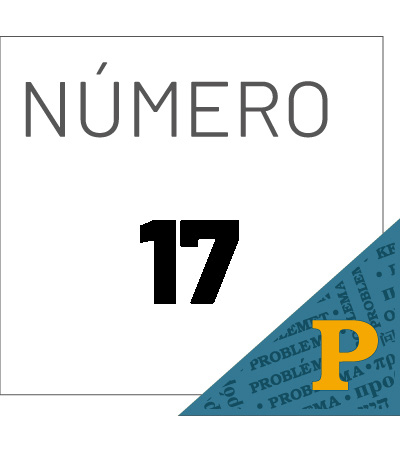Refugeehood Reconsidered: The Central American Migration Crisis
The number of refugees in the world amounts to more than one percent of the entire world population. This essay is an attempt to think about this question and assess the literature that addresses it, especially from the standpoint of ethics and political theory, and a grounding in real-world problems. The paper is intended as an introductory discussion for those interested in the debates about who should qualify for refugee status, especially in light of the predicament of Central Americans fleeing from the disorder. It pays special attention to the claim that the US has reparative obligations to Central American countries owing to US interventionist policies.
Article Details
Use of Creative Commons (CC) licences
All texts published by Problema. Anuario de Filosofía y Teoría del Derecho, without exception, are distributed under the CC-BY-NC-ND 4.0 International licence, which allows third parties to use what is published, as long as they mention the authorship of the work and the first publication in this Anuario.
Accessibility to articles and other publications in whole or in part under the concept of copying, distribution, public communication, interactive access (via the Internet or other means), while explicitly acknowledging the author(s) and the journal itself (acknowledgement of authorship).
Please note that if articles are remixed, modified or fragments are used in other creations, the modified material may not be distributed, nor may versions be reconstructed from the original published articles (derivative works).
The use of the contents of the published articles, in whole or in part, for profit-making purposes (non-commercial acknowledgement) is prohibited.
See https://creativecommons.org/licenses/by-nc-nd/4.0/

This work is licensed under a Creative Commons Attribution-NonCommercial 4.0 International License.
References
Achiume, E. T. (2019) Migration as Decolonization. Stanford Law Review, 71, 1509.
Blake, M.I., (2020) Justice, Mercy, and Migration, Oxford, chapter 6.
Buxton, R. (2019), “Reparative Justice for Climate Refugees,” Philosophy 94, pp. 193-219.
Camacho-Beltrán, E. (2022). A Just Public Charge Rule in VEREA Mónica y TIGAU Camelia (eds.), Trump’s Legacy in Immigration Policy Postpandemic Challenges for Biden (pp. 159-188). México: CISAN-UNAM.
Carens, J. H. (1991), “Refugees and States: A Normative Anaylis,” Canadian and American Refugee Policy, York Lanes Press, pp. 18-29.
Cherem, M, (2016), “Refugee Rights: Against Expanding the Definition of a Refugee´and Unilateral Protection Elsewhere” Jrnl Pol Phil, p.186.
Easterly, W. (2006). The White Man’s Burden: Why the West’s Efforts to Aid the Rest Have Done So Much Ill and So Little Good, Penguin.
Ferracioli, L. (2022). Liberal Self-Determination in a World of Migration, Oxford UP.
Gibney, M. J. (2018), “The Etics of Refugees”, Philosophy Compass, pp. 1-9.
Haddad, E. (2008), The Refugee in the Internacional Society: Between Sovereigns, Cambridge Studies in International Relations, Series Number 106.
Lister, M. (2013), "Who Are Refugees?" Law and Philosophy 32 (5):645-671, 660.
Lister, M. (2008), “Gang-related asylum claims: an overview and prescription,” The University of Memphis Law Review, Vol. 38(4), p. 827
Lister, M. (2004), “Who Are Refugees,” 660, citing Gibney, M. J., The Ethics and Politics of Asylum: Liberal Democracy and the Response to Refugees, Cambridge UP 2004, and see chapters 3-6.
Macedo ST. (2004). “What Self-Governing Peoples Owe to One Another: Universalism, Diversity, and The Law of Peoples,” Fordham Law Review, Special Symposium Issue on Rawls and the Law, 72, pp. 1721–38.
Miller, D. (2016), Strangers in Our Mist. The Political Philosophy of Inmigration, p. 80.
Montero, J. (2022) Human Rights as Human Independence: A Philosophical and Legal Interpretation, University of Pennsylvania.
Owen, D. (2020), What do We Owe to Refugees? Cambridge.
Passel J, D´Vera, C, González-Barrera, A. (2012), Net Migration from Mexico Falls to Zero – and perhaps less, Pew Hispanic Center Report, Washington, DC.
Rawls, J. (2019) The Law of Peoples, Harvard UP: 1999; Stilz, A., Territorial Sovereignty: A Philosophical Exploration, Oxford.
Shacknove, A. (1985), “Who is a Refugee?”, pp. 274-284.
Schenoni, L. and Mainwaring, S. (2018), “US Hegemony and Regime Change in Latin America,” Democratization 26, p. 272.
Villarreal, A. (2014), “Explaining the Decline in Mexico- U.S Migration: The Effect of the Great Recession.”
Villegas, P. (2019) “A Record Wave of Lone Child Migrants, Born of Desperation”. The New York Times, p. A7.
Walzer, M. (1983) Spheres of Justice: A Defense of Pluralism and Equality, chapter 2, Membership.



























